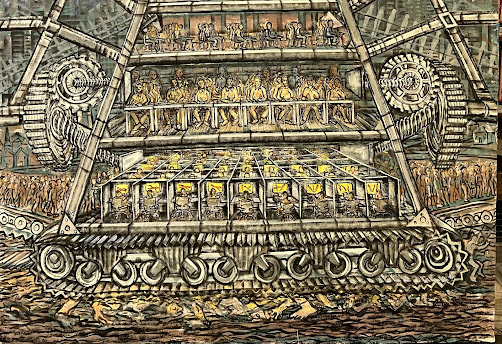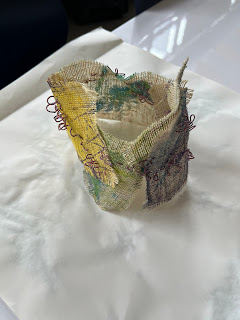Does 16000 Hours of Narrow Curriculum Experience Cause Psychological States of Alienation?
“What separates art from all other classes is that the challenge is not getting the right
answers on the test for good grades but rather trying to improve your mind as a thinker and as
someone who achieves through their own doing.” Erik, 10th grade, 2014
As ed-tech big-wigs and education policy makers
influence classroom curricula by saturating children’s school time with an onslaught of digital screen-based learning activities, a professional teacher crisis in K12 education continues and a marginalization of school-situated, creativity-based, experiential learning activity continues to occur. Opportunities for authentic self-expression are
whittled away by data-collection curriculum schemes.
I guarantee you, No Child Left Behind and Race to the Top federal education policies exacerbate children's
psychological alienation. This country's epidemic of school violence, children's mental health and juvenile suicide crisis are symptoms of psychological alienation.
I'm not against the use of technology in the classroom. I am against it's impersonal use to further an experience of non-consensual standardization, rote-memorization and depersonalization. Wherever curricula subjects are siloed, content fragmented, selected response assessment activity narrowly focused on data accumulation, competition, rewards and punishments, vast swaths of children in K12 school environments are
left-behind.
Contrast K12 data-driven, competition-based, digital screen experiences with authentic, trans-disciplinary, hands-on, media-rich forms of creativity in which the authentic self and embodied learning is represented within the activity. One can see that child development problems might arise when young bodies meant for the development of playful, active creative agency, are forced into passive, behavioral-conditioning exercises with a steady stream of electrified visual prompts.
What happens after a child spends 16000 hours of school based experience in such learning environment? Harry Harlow's work, while
unethical, provides us with insight into the problems of social isolation, multi-sensory stimulation, love and play as it affects an organisms development.
High stakes standardized testing has become the centerpiece of K12 American curricula experience whether folks like to admit it or not. Standardized test scores become the defacto “measure” of a
school’s quality. A bell-curve score designation determines the continued existence of that school so, yes… test scores and test prep influence the nature of a child’s school-based learning experience.
There is a price to pay for society when legislators and administrators negate children's creative learning experiences in school where children are marched through a curricula that amounts to test-preparation conditioning exercises.
Development of the authentic-self through self-directed and collaborative learning pathways are so necessary for the maintenance and cohesion of democratic societies. Sadly, you will not find many of these kinds of experiences in authoritarian-based, test prep schools. Information processing experience, drill and kill, operant conditioning learning programs are a feature of authoritarian-based schools.

Failures of imagination have consequences. Spawned out of the 40+ year high stakes testing program are children who grow into dehumanized adults afflicted with a deadening of the human spirit. The ethos of test-prep schools and test-centric curricula is a culture of action without critical thought. Hannah Arendt warned us about such educational experiences as prolonged exposure condition human beings for authoritarian rule.
As I leave K12 education after 40 years, I view
J6 as a watershed moment in the history of American education. This historical moment is evidence of an education system that leaves its citizens susceptible to authoritarian control. It's clear, if one’s formal education is dominated by behavioral conditioning, direction taking, instructional drilling, tasking, competition, one begins to view fellow human beings as “the other.” Students alienate themselves from fellow human beings. The J6 mob, formally educated throughout the US, were instructed to route the US Capitol and to “fight like hell,” and decapitate democratic governance.
J6 is evidence of the ineffectiveness of US educational policy to promote and sustain democratic society. American society
lacks insight into what it means to be a part of a participatory democracy. Because vast numbers of US citizens are conditioned as children to experience the heavy hand of forced compliance, pedagogies of fear and unresolved trauma due to humiliation of school failure, ranking and sorting, I fear for the future of American democracy. Victims of school alienation identify with their authoritarian tormentors and view fellow human beings as "the other."
When half of eligible American voters do not show up to vote and don't care about it, what does that say about the failure of formal education to prepare them for participation in civil society?
The antedote to this situation will take years to remedy...if we ever get another chance. It begins with the realization that the human mind is more than a blank slate and education is an individual-driven process. Where the needs of the learner take precedent over the needs of authority where consensual learning, authentic creative learning experience and self-directed study should be the centerpiece of the school curricula.




































































